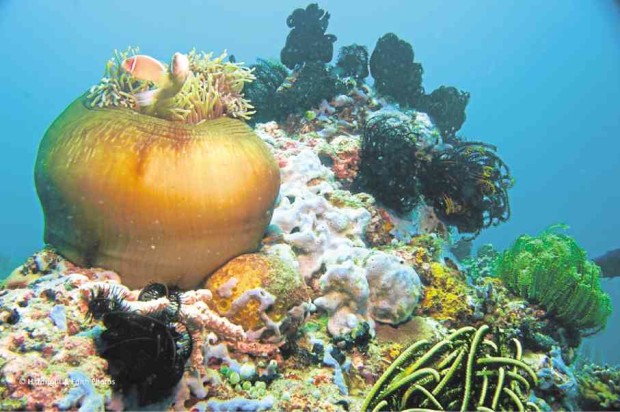Network formed to protect resource-rich Verde Island Passage

Section of the Twin Rocks marine protected area in Barangay Anilao in Mabini, Batangas, one of the popular dive spots in Verde Island Passage —PHOTO COURTESY OF SMARTSEASPH PROJECT
BATANGAS CITY—Efforts to protect the Verde Island Passage (VIP), one of the country’s most important marine protected areas, got a boost after the United Nations Development Program (UNDP), marine conservation groups and several government agencies formed a multisectoral network on Wednesday to ensure the preservation of this natural resource base.
VIP is a 1.14-million hectare marine ecosystem located off the coastlines of Batangas, Romblon, Marinduque, Occidental Mindoro and Oriental Mindoro provinces. It is dubbed as the global center of shorefish biodiversity.
Aside from representatives from the provincial governments, the signatories to an integrated marine protection and law enforcement network included the Philippine National Police, the Philippine Coast Guard, and the Bureau of Fisheries and Aquatic Resources.
Titon Mitra, UNDP country director, said VIP alone is home to hundreds of fish species, sea turtles, mangroves, sea grass and at least 338 coral species, of which eight are identified as “extremely rare.”
He said UNDP had started working with Philippine government agencies in raising awareness on the protection of land and marine-based biodiversity areas and perhaps, push for legislation to strengthen laws on intellectual property to allow the Philippines to exploit and benefit from its untapped genetic resource base.
Article continues after this advertisement“The Philippines, because of its huge biodiversity, is potentially a great source of these genetic resources. But the problem, as of the moment, is that intellectual property is often not held [in the Philippines],” Mitra said.
Article continues after this advertisementThe network is encouraging academic institutions as well as the private sector to invest in research into this untapped natural wealth.
“The first objective is to make sure that the Philippines has that intellectual property rights. Once you identify where the sources are, then you protect it (and) you create the value chain,” Mitra said.
Marine conservationists are also supporting the declaration of VIP as a World Heritage Site to raise global awareness and put pressure on the national government to protect the region, according to Dr. Vincent Hilomen, program leader of the Department of Environment and Natural Resources’ SMARTSeas project.
Enrique Nuñez Jr., Conservation International country executive director, said an integrated marine protection and law enforcement network created not only a “knowledge hub” but also a sustainable program for the benefit of almost two million people dependent on the VIP region. —MARICAR CINCO